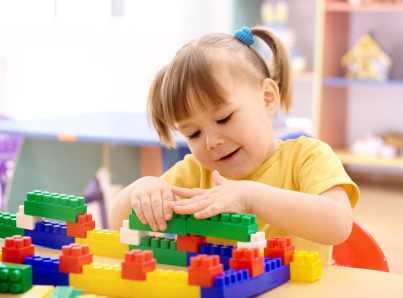Children participating in a daycare curriculum that incorporates play receive immeasurable—and measurable—benefits. Children naturally learn through play that engages all five senses. Plus, children learn just how fun, well, learning can be!
 4 reasons (and tips) to include play in a daycare curriculum
4 reasons (and tips) to include play in a daycare curriculum
- Play gives children the opportunity to try out new ideas and concepts in a safe environment. Cognitive benefits include boosts to imagination, problem solving, and abstract thinking. Tip: Ask and incorporate children’s ideas into the lessons. Learning about farms? Ask children what kind of animals they would see on the farm. What would they sound like? How would they move? You never know what kind of farm children might create together!
- When children play together, they practice cooperation, sharing, taking turns, and conflict resolution—all vital skills needed for success in school, at home, and in life! Tip: Point out positive behavior you see throughout the day.
- The language benefits of play include storytelling, vocabulary acquisition, communication skills, and even emergent literacy. Tip: After reading a book to the class, create an “And Then” story together. What happens to the characters after the book ends? After each child’s turn as storyteller, say “And then…”
- Play provides opportunities for physical development, such as fine- and gross-motor skills, physical challenges, and self-help skills. Tip: Go outside and play. Research shows children can better concentrate and self-regulate after spending time on a playground during the day.
Preschool curriculum uses music (and play!) to promote school-readiness skills
ABC Music & Me is a standards-based supplemental daycare curriculum. All levels of our toddler and preschool curriculum use music, movement, and play to cultivate turn-taking and sharing, improve self-control, enhance creativity, and boost early language development and early literacy.
For more information about bringing our preschool curriculum to your childcare or daycare, email us at info@abcmusicandme.com.



 “I think play is an expression of our creativity; and creativity, I believe, is at the very root of our ability to learn, to cope, and to become whatever we may be. To me, play is the process of finding new combinations for known things – combinations that may yield new forms of expression, new inventions, new discoveries, and new situations.”
“I think play is an expression of our creativity; and creativity, I believe, is at the very root of our ability to learn, to cope, and to become whatever we may be. To me, play is the process of finding new combinations for known things – combinations that may yield new forms of expression, new inventions, new discoveries, and new situations.”